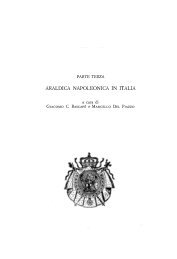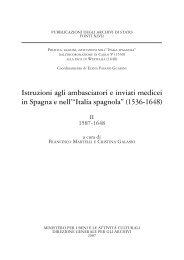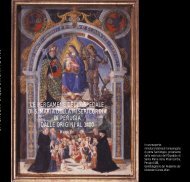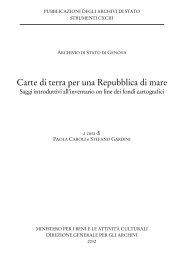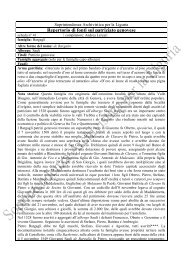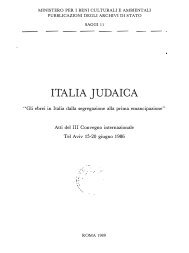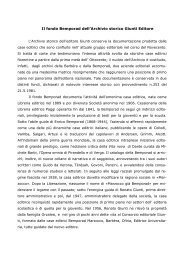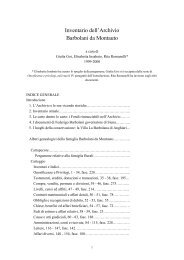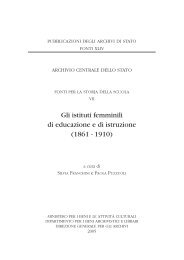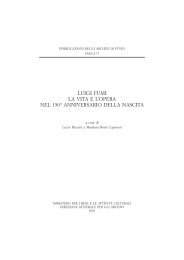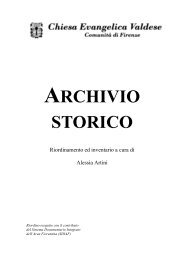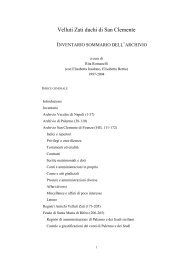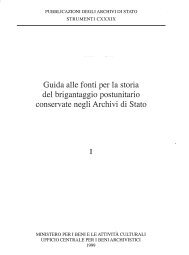ITALIA JUDAICA - Direzione generale per gli archivi
ITALIA JUDAICA - Direzione generale per gli archivi
ITALIA JUDAICA - Direzione generale per gli archivi
You also want an ePaper? Increase the reach of your titles
YUMPU automatically turns print PDFs into web optimized ePapers that Google loves.
146 Abraham Melamed<br />
Another example is to be found in Shlomo Ibn Verga's Sebeth Yehudah,<br />
written in the first half of the sixteenth century. In his discussion of Jewish<br />
history, Ibn Verga used, again and again, the same expression, « .n,.Vto ;,,C »<br />
i.e. « natural cause » 23, and attempted to explain thereby Jewish history. Ibn<br />
Verga, however, unfortunatly falis beyond the scope of this study.<br />
Yet another example is to be found in the writings of Azariah de' Rossi.<br />
In his criticai revaluation of the Sages' famous Agaddah about the death of<br />
Titus which was caused by the penetration of an insect into his brain, De'<br />
Rossi related, first of ali, to physical, biologica! and medicai considerations,<br />
ali of which brought him to the conclusion that this event could not have<br />
happened according to the laws of nature, « .Vt::l:-t ';lN .n,.V NS » 24•<br />
Por him, whatever was a natural impossibility was also necessarily an historical<br />
impossibility.<br />
It is significant that de' Rossi did raise, in this context, the possibility<br />
of a miracle, which in his opinion was not impossible, depending on Divine<br />
Will. However, he did not continue to elaborate this possibility, and went on<br />
to deal with the historical evidence. The occurrence of a miracle in history<br />
is theoretically not impossible, but he does not relate to it further in his<br />
discussion of the historical event.<br />
The strongest influence of Renaissance historiography's attempt to give<br />
rational and natural explanations to historical occurrences is found in Simone<br />
Luzzatto's Discorso (1638) 25• This kind of historical reasoning comes forth<br />
in various aspects of the Discorso, in which Luzzatto attempts to explain to<br />
his Gentile audience the true meaning and uniqueness of Jewish history and<br />
religion.<br />
One clear example is the influence of the cyclical theories of history, or<br />
what is calied, the idea of historical recurrence. An echo to this theory<br />
we already found in Abravanel. These theories were adapted by Renaissance<br />
historiographers from classica! sources, mainly Aristotelian and Polibian. A most<br />
illustrative example for the application of the idea of historical recurrence it<br />
to be found in Machiavelli's conception of history.<br />
Machiavelli distinguished between two correlated historical cycles. The<br />
inner cycle is national: the cycle of governments within a given state, which<br />
<strong>per</strong>petually revolve, according to the Polibian scheme, from a positive form of<br />
23 S. IBN VERGA, Shebeth Yehudah, ed. A. SHOHAT, Jerusalem 1947, pp. 27, 40, 41;<br />
M. A. MEYER, Ideas of Jewish History ... cit., pp. 110-114; Y. H. YERUSHALMI, Clio and the<br />
Jews . .. cit., p. 627.<br />
24 AZARIAH DE' Rossi, Meor Einaim, Vilno 1863. See S. W. BARON, Azariah de' Rossi's<br />
Historical Method ... cit., p. 216.<br />
25 S. LuzZATTO, Discorso... cited. A limited photoreproduced edition appeared in<br />
Bologna, 1976. The Hebrew translation entitled Ma'amar al Yehudei Venezia was published<br />
in Jerusalem, 1950, edited by A. Z. AESCOLY, with introductory essays by M. Shulvass and<br />
R. Backi, and notes by Y. Levy, A. Z. Aescoly and I. Baer.<br />
The Perception of ]ewish History in Italian ]ewish Thought 147<br />
government (i.e. Monarchy, Aristocracy and Democracy) to a negative form of<br />
government (i.e. Tyranny, Oligarchy and Anarchy) 26•<br />
The outer cycle is international: the <strong>per</strong>petuai rise and fall of nations<br />
throughout history. The two cycles are interrelated. Internai decay which<br />
is the result of the generai instability caused by the <strong>per</strong>petuai change in the<br />
form of government and the specific negative effects of the evil forms of<br />
government, necessarily causes a declin in the international standing of the<br />
state.<br />
In his history of Florence Machiavelli relates to the internai cycle, success<br />
bringing peace, which is followed by civil tranquillity, necessarily resulting<br />
in weakness and disorder. Instability causes the destruction of the state<br />
from which a new order developes, ushering in a new <strong>per</strong>iod of virtue, fortune<br />
and glory, and so forth as the cycle <strong>per</strong>petualiy continues 27•<br />
In the opening of the second book of the Discorsi, Machiavelli relates<br />
to the external cycle. The world is always the same, virtues and vices are<br />
always the same. They only wander from piace to piace, from one nation<br />
to another. This causes the <strong>per</strong>petuai rise and fali of the international powers.<br />
Machiavelli gives, of course, the example of ancient powers: virtue moves<br />
from Assiria to Media, from Media to Persia and finaliy to Rome 28 •<br />
Basically the same ideas were repeated by Giovanni Botero and other<br />
historians and politica! thinkers of the late Italian Renaissance and the Counter<br />
Reformation 29• One of them was Simone Luzzatto, the Jew, who was strongly<br />
influenced by Machiavellism and the ensuing politica! theory of the « Ragione<br />
di Stato » 30• The uniqueness of his contribution was in the application of<br />
this theory to Jewish history.<br />
26 N. MAcHIAVELLI, Discorsi, in Tutte le O<strong>per</strong>e, a cura di M. MARTELLI, Firenze,<br />
1971, pp. 78-81. On the whole issue, see G. W. TROMPF, The Idea o/ Historical Recurrence<br />
in Western T hought from Antiquity t o the Reformation, University of California press,<br />
1979, eh. 5.<br />
27 N. MACHIAVELLI, I storie fiorentine, in Tutte le O<strong>per</strong>e... cit., p. 738 « ... e così<br />
sempre da il bene si scende al male, e da il male si sale al bene. Perché la virtù partorisce<br />
quiete, la quiete ozio, l'ozio disordine, il disordine rovina; e similmente dalla rovina nasce<br />
l'ordine, dall'ordine virtù, da questa gloria e buona fortuna ».<br />
28 ID., Discorsi ... cit., p. 145 « ... il mondo sempre essere stato ad uno medesimo modo,<br />
ed in quello essere stato tanto di buono quanto di cattivo; ma variare questo cattivo e questo<br />
buono, di provincia in provincia: come si vede <strong>per</strong> quello si ha notizia di que<strong>gli</strong> regni antichi,<br />
che variavano dall'uno all'altro <strong>per</strong> variazione de' costumi; ma il mondo restava quel medesimo.<br />
Solo vi era questa differenza, che dove quello aveva prima allogata la sua virtù in Assiria,<br />
la collocò in Media, dipoi in Persia, tanto che la ne venne in Italia ed a Roma ». See also<br />
P. BURKE, Tradition and Ex<strong>per</strong>ience ... cit., pp. 140-144.<br />
29 P. BuRKE, Tradition and Ex<strong>per</strong>ience ... cited.<br />
30 R. BACHI, La Dottrina sulla Dinamica delle Città secondo Giovanni Botero e<br />
secondo Simone Luzzatto, in « Rendiconti della Accademia Nazionale dei Lincei, classe di



